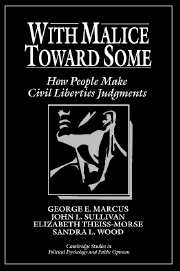Book contents
- Frontmatter
- Contents
- List of Figures and Tables
- Preface: Political Tolerance and Democratic Life
- PART I Theoretical Background and Overview
- PART II Contemporary Information and Political Tolerance Judgments
- PART III Refining the Model – The Role of Antecedent Considerations as Individual Differences
- PART IV Implications and Conclusions
- Appendix A: Hypothetical Group Scenarios and Manipulations
- Appendix B: Methodological Approaches and Scales
- Notes
- References
- Index
PART II - Contemporary Information and Political Tolerance Judgments
Published online by Cambridge University Press: 05 August 2012
- Frontmatter
- Contents
- List of Figures and Tables
- Preface: Political Tolerance and Democratic Life
- PART I Theoretical Background and Overview
- PART II Contemporary Information and Political Tolerance Judgments
- PART III Refining the Model – The Role of Antecedent Considerations as Individual Differences
- PART IV Implications and Conclusions
- Appendix A: Hypothetical Group Scenarios and Manipulations
- Appendix B: Methodological Approaches and Scales
- Notes
- References
- Index
Summary
In this part, we begin the process of empirically testing the theoretical model of tolerance judgments we laid out in Part I. Since past research has focused almost exclusively on the effects of antecedent considerations on tolerance, we must first establish that contemporary information makes a difference. If tolerance judgments are based solely on the predispositions and standing decisions people hold, then a major part of our theoretical argument – especially the role of threat as contemporary information – would be fallacious. On the other hand, if contemporary information influences tolerance judgments even when we take antecedent considerations into account, then we have taken the first step toward substantiating our theory.
We empirically test our basic model in two ways. First, in Chapter 4 we conduct survey-experiments that allow us both to measure the crucial antecedent considerations found to be important in past research and to manipulate the information subjects receive to determine if certain kinds of contemporary information affect tolerance more than others. If our theoretical model is correct, we should find that antecedent considerations play a major role in determining contemporary tolerance judgments, but that contemporary information matters as well. Specifically, as we argued in Chapter 3, it is threatening information, especially about a group's behavior, that should significantly influence people's tolerance judgments. Second, in Appendix 4A we lay out, for interested readers, our checks to validate the studies.
- Type
- Chapter
- Information
- With Malice toward SomeHow People Make Civil Liberties Judgments, pp. 53 - 54Publisher: Cambridge University PressPrint publication year: 1995

